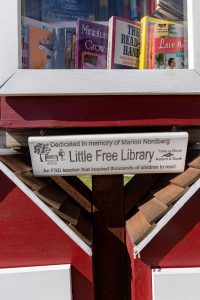By Corinna Ortega

Little Free Libraries is a nonprofit organization that puts mini libraries on the map. You can purchase a set from their website, or handcraft your own as plain or fancy as you’d like. There are no membership fees or return dates, and their motto of “take one, give one” is to be respected. Residents in Fullerton and nearby cities have already jumped on board and planted over 30 of these cubbies near schools and on their own lawns.
Lisa Luckey, a Fullerton resident, honors her mother with the Faye Smith Memorial Library. “It impacts the spirit of community by showing hospitality. You always know the home is welcoming you,” she explains. As a result, people willingly come to show appreciation by donating books.
Mother of three, Patricia Serban, is a Whittier resident who bolted a mini fridge to her gate to create her own LFL. After paying fees for online registration to Little Free Libraries, she received a plaque with her personal charter number. “I have always wanted to get books into children’s hands because I believe they can have a large impact as it did with my childhood,” Serban says. She paid $40 for the official LFL registration so her book cubby would show up on their map and reach more people.
Anyone can put a free library in their front yard, but Little Free Libraries has formalized the process. When you purchase an LFL from the organization you are given a starter kit of books and a platform to broadcast your location. Others simply create their own and get attention via word of mouth and social media.
Tod Bol and Rick Brooks, founders of LFL, set up a few book stations in Wisconsin in 2009 and started a system, but both knew it wasn’t new. In an interview with University of Wisconsin magazine, Brooks predicted for every registered cubby there are two to four that go unrecorded.
From “Captain Underpants” to “20,000 Leagues Under the Sea,” these decorative cubbies are bursting with genres for every adult and child. “Books help us escape tough times,” says Serban, “I’ve seen the smile on kid’s faces as they run to see what is new; neighbors I hardly talk to, or never met, come over and bring books and start a conversation.”
Despite positive testimonies, challenges linger. Conflict occurred at Pamela Harr’s Chino home. Harr woke up to find the book house her daughter and son-in-law gave her blown to bits by hazers. After filing a police report and posting on LFL’s private Facebook group about the incident, a father from her local Girl Scout troop donated a cubby.
Jane Schmidt and Jordan Hale, two Canadian research librarians, point out other issues with Little Free Libraries. They conclude through their research that these libraries are predominantly shown in wealthier neighborhoods and are more of a “performative act of literary philanthropy” than a public resource.
But people like Barbara Ward, an Anaheim resident, see it as a way to help others. She found a new purpose for her book cubby during the COVID-19 crisis in April by transforming her library into a supply station. She took out her books and provided sanitizer and notecards for all to stay safe and connected. That sense of connection is what made her set up her cubby in the first place.
“This is just a little way of sharing the love of reading and hoping someone will find a book that brings them joy or makes them think” Ward says, “Someone who might not walk into a bookstore or couldn’t afford to buy a book can take a book and keep it. I want everyone to know that they are important and that they matter.”
